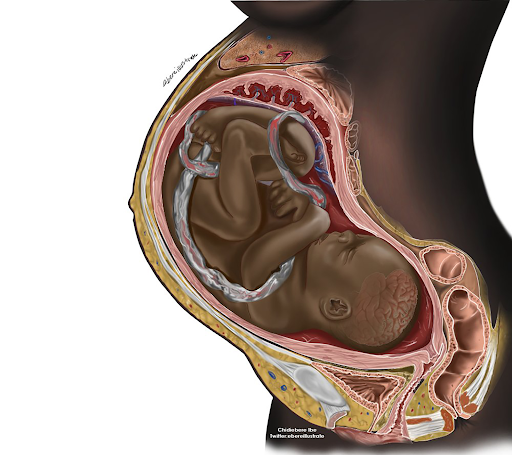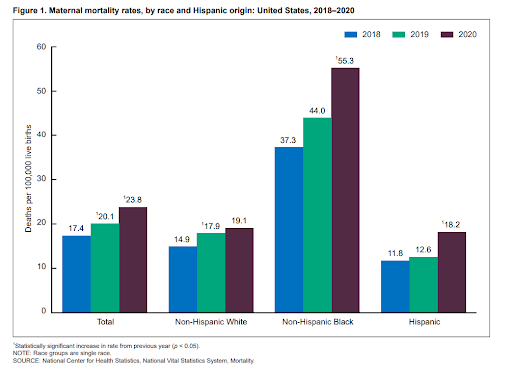What is Maternal Health Awareness Month?
Maternal and infant health and mortality are impacted by poverty, gender inequality, age, multiple forms of discrimination, lack of access to adequate health facilities, inadequate technology, and lack of infrastructure. The death per live birth for black women is three times higher than that of white women. Between 2007 and 2016, the national maternal mortality rate for black women with at least a college degree was five times higher than white women with a similar education, illustrating the direct connection between race and maternal mortality, beyond race-associated socioeconomic factors. The Virginia General Assembly notes that the root cause of these disparities is longstanding structural racism which results in poor health indicators and outcomes for individuals and communities of color.

Illustration of fetus in utero by Chidiebere Sunday Ibe.
In 2020, the Virginia General Assembly designated July as Maternal Health Awareness Month through House Joint Resolution No. 111. During this month, we recognize the current state of maternal health in the Commonwealth and promote awareness of the many ways to improve it.
The overall health of the mother as well as the child is critical throughout the pregnancy. As many changes take place during pregnancy, it is especially important to pay attention to emotional as well as physical health. There are several steps that can be taken to assist in maintaining optimal mental and physical wellness.
- Create a plan – Review your existing health insurance policy to understand what is covered from prenatal needs to newborn care. Learn more about insurance coverage during pregnancy here. Consult with a health care provider to discuss any existing health conditions, prescribed medication and/or lifestyle changes (drug and/or alcohol use) that may need to be modified prior to conception.
- Prenatal care – Regular check-ups and daily choices (including taking a daily multivitamin with 400 micrograms of folic acid) throughout the duration of pregnancy can contribute to a safe and healthy delivery. The following represents a complete schedule for prenatal medical visits:
- Weeks 4 – 28 of pregnancy – checkup every 4 weeks (1x per month)
- Weeks 28 – 36 of pregnancy – checkup every 2 weeks (2x per month)
- Weeks 36 – 41 of pregnancy – checkup every week (4x per month)
- Postnatal care – It is equally important to continue care post-delivery, particularly during the 12 weeks following birth, sometimes called the “4th trimester.” The first postpartum checkup should occur within 6 weeks of delivery to evaluate recovery from labor and birth. As of 7/1/2022, Medicaid and FAMIS MOMS members in Virginia now have full coverage through 12 months postpartum. In addition to physical postpartum healing, mental health can be especially challenged during this period. Postpartum depression can develop in anyone following delivery, so it is important to communicate your mental health symptoms with your healthcare provider, lean on your support system (family, friends, childcare, community organizations), and utilize mental health resources, including the National Maternal Mental Health Hotline 1-833-9-HELP4MOMS.
The Virginia Department of Health (VDH) and other health organizations offer a wealth of information and resources regarding pregnancy, family planning, WIC Benefits (Women, Infants, and Children), breastfeeding, and more.
References:
- Virginia General Assembly, HOUSE JOINT RESOLUTION NO. 111 Retrieved July 6, 2022.
- Centers for Disease Control and Prevention. (Nov 2021). Planning for Pregnancy. Retrieved July 6, 2022.
- Centers for Disease Control and Prevention. CDC Infographic: Racial/Ethnic Disparities in Pregnancy-Related Deaths — United States, 2007–2016.Retrieved July 8, 2022.
- Hoyert, D. (2022, February). Maternal Mortality Rates in the United States, 2020. Centers for Disease Control and Prevention. Retrieved July 11, 2022.
- March of Dimes. (2017, June). Prenatal Care Checkups. Retrieved July 11, 2022.
- March of Dimes. (2020, September). Health Insurance During Pregnancy. Retrieved July 11, 2022.
- Health Resources and Services Administration. (May 2022).1-833-9-HELP4MOMS – National Maternal Mental Health Hotline. Retrieved July 15, 2022.
- Virginia Department of Medical Assistance Services. (November 18, 2021). Virginia Medicaid Announces 12-Month Postpartum Coverage. Retrieved July 15, 2022.

